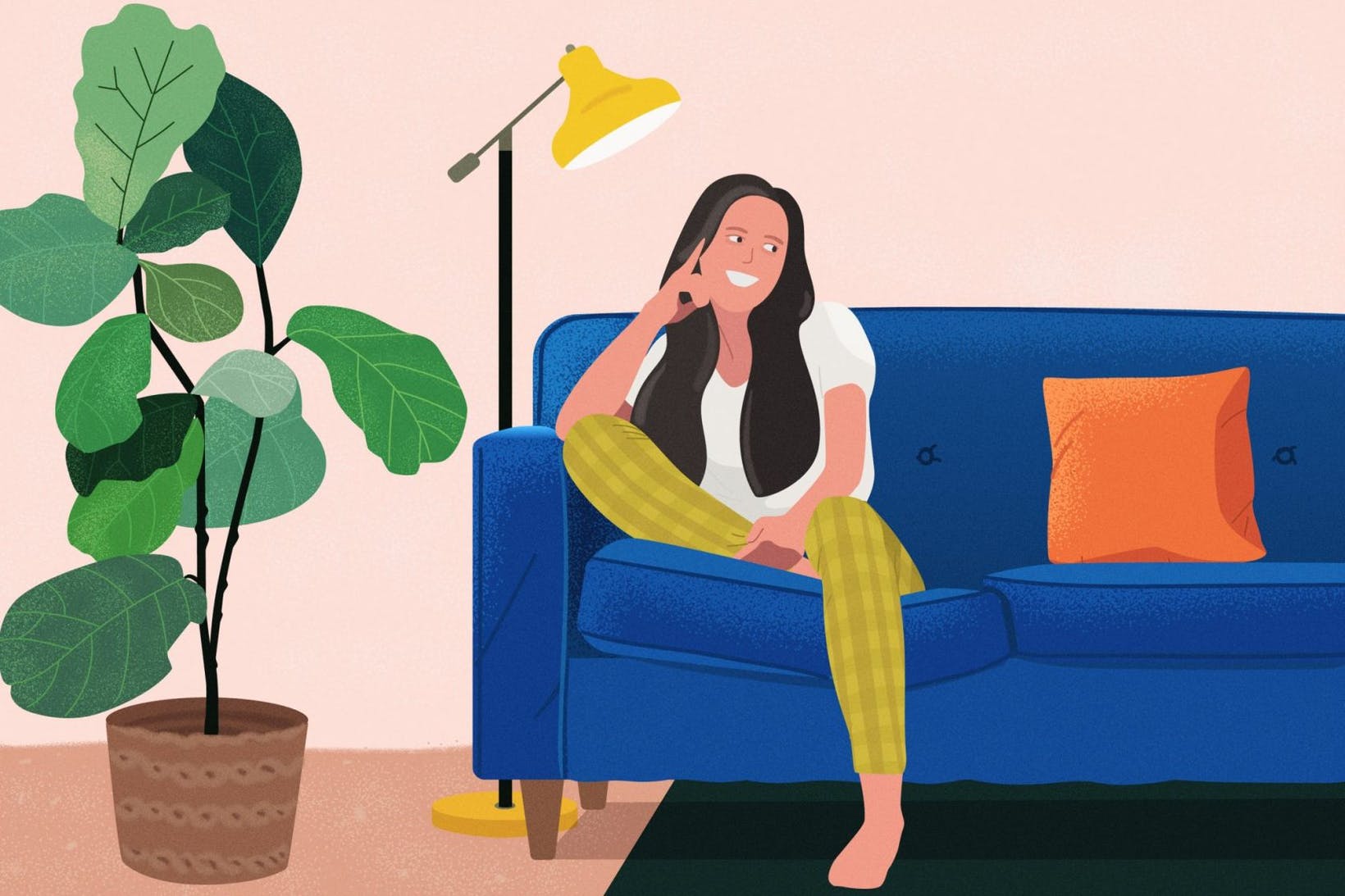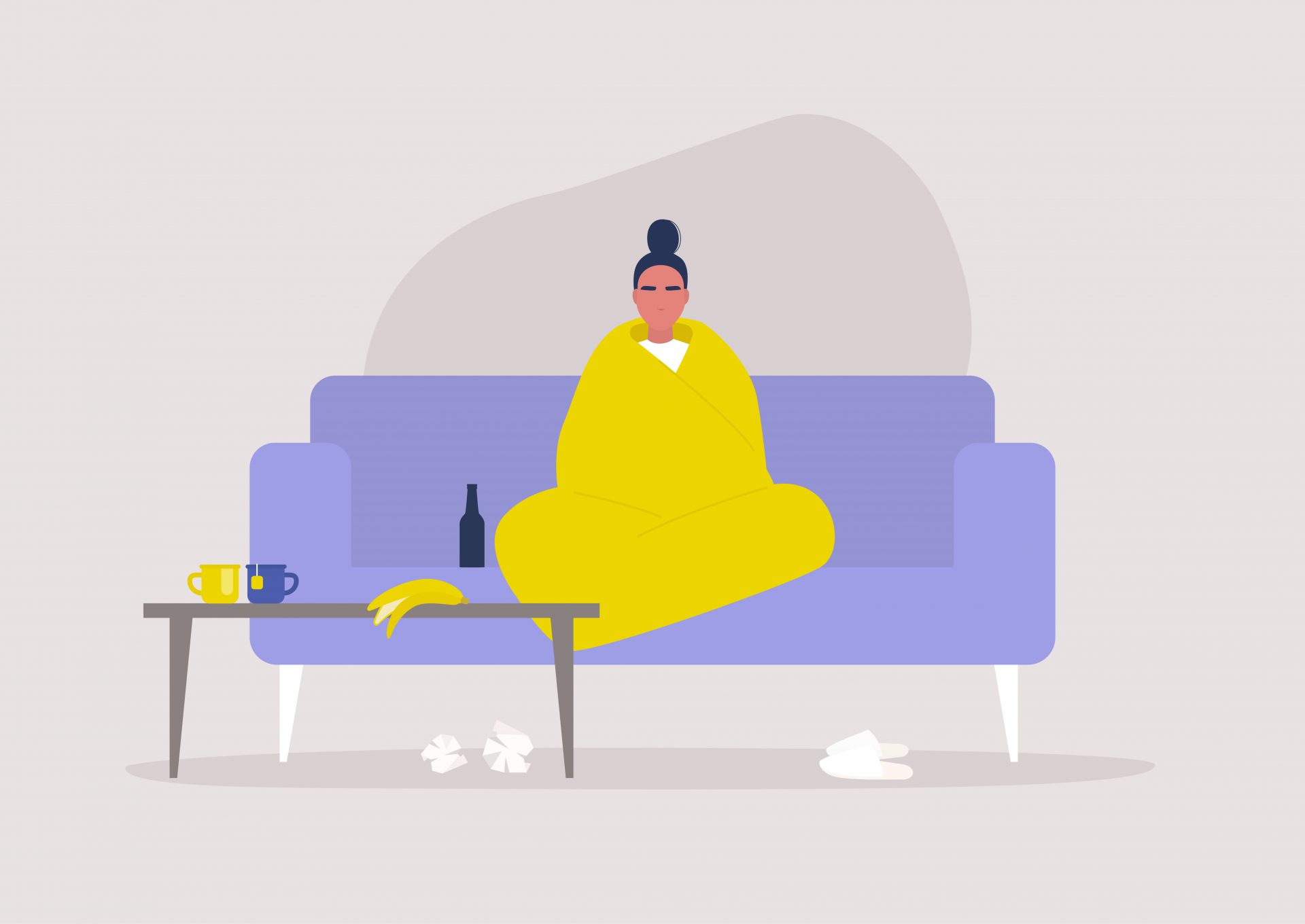Written by Hollie Richardson
Hollie is a digital writer at Stylist.co.uk, mainly covering the daily news on women’s issues, politics, celebrities and entertainment. She also keeps an ear out for the best podcast episodes to share with readers. Oh, and don’t even get her started on Outlander…
Do you feel like you’re still very much in survival mode while people around you are starting to thrive in the pandemic? Don’t panic, because you’re not the only one…
The first lockdown was all about survival. We hadn’t been through a pandemic before, anxieties and fears were rife, and our daily lives changed overnight. It was OK to just get up in the morning, work a shift from home, binge watch Normal People and try to get a good night’s sleep for the next day ahead. Sure, there were those people who started writing novels and baking endless batches of bread. But we all knew it was more than enough to just survive. In fact, most of us leaned into this new way of life.
Strange things then started to happen after a few months. Restrictions lifted, the weather warmed up and the government invited us to spend money, eat out and enjoy staycations. People started new jobs, returned to the gym, moved into new homes and showed off the dresses they’d bought online with all that saved money. Instagram lit up with selfies that didn’t involve tracksuits and living rooms. Suddenly, it was time to thrive.
And here we are another few months later, surviving a very cold, long and boring lockdown. The coronavirus case and death rates have been devastating. UK unemployment is likely to reach 2.6 million in the middle of 2021. And we have no idea when this will all end. But at least a lot of the fear and worry has subsided. Wearing masks and queuing up outside of Tesco doesn’t feel like we’ve stepped into a dystopian film so much anymore. Many of us are getting used to this way of living and finding ways to just get on with it. Does this mean we should be doing a bit more than simply surviving at this stage in the pandemic?
It’s something I’ve been asking myself recently. I’ve spent the last year trying not to rock the boat that is my relatively privileged life. I have good health, a stable job, a nice room in a flatshare, friends and family who I’m in regular contact with and enough money to treat myself to Just Eat deliveries on a Friday night. When summer arrived, I thrived by going on dates, meeting up with friends for dinner and even going on a trip to Cornwall. But since going back into hibernation for a third lockdown, it feels like my time to thrive is over again.
I’ve noticed, however, that some people around me are thriving in bigger and better ways than I could ever imagine. A lot of my friends are getting job promotions, announcing pregnancies, moving in with their partners and paying off debts they could hardly keep on top of before. Meanwhile, I’ve been counting my 5K runs, lower alcohol consumption and home-cooked meals as my biggest achievements of the year. The most excitement I get is a new episode of The Great and my monthly bookclub Zoom. But I’m not as scared or lonely as I was in the first pandemic, so should I be pushing myself to think big, want more from life and go for it from now on?
“I imagined that, by this point in the pandemic, I’d have settled into the perfect Instagrammable life routine,” my friend Kayleigh told me when I asked if she felt the same. “That I’d be batch-cooking healthy meals on the weekend, going for runs every other night, eating grapefruit for breakfast every morning, going to bed with a book in hand at a decent time.
“Despite having three hours of my life back (see ya, commute!), I’m still not quite there yet. I work late, I skip lunch, I make dinner or order takeaway depending how tired I am. I have been on about… ooh, four runs in total over the past 12 months? But I AM going for two long walks a day with the dog, I’ve slowly started getting some semblance of a skincare routine together, I’ve started setting a 60-minute timer twice a week for cleaning purposes, and I am usually in bed by 10:30pm at the latest.
“I guess what I’m saying is this: I’m getting there. Slowly. I’m not thriving by any means, but I’ve crept out of survival mode… and I’m ready to embrace a healthier mindset to tip me closer towards all those oh-so-happy, oh-so-zen, permanently-in-workout-gear people I see on Instagram every day.”

“I don’t think I realised it at the time but, looking back, I was actually thriving (or at least not hating life) during the first lockdown,” my other friend Chloe tells me. “I was living with my best friend, starting a new job that had me filled with creative energy and spending the weekends going on long walks, cooking delicious meals and drinking a lot but without any of the social anxiety that comes from real-world partying. Yes I’d have rather been enjoying the normal life, of course, but lockdown felt like a bit of a respite. It was all a bit work hard, play hard, rest hard.
“Now, I feel as though life has been sucked out of me. I can barely get through the day without feeling burnt out. I have had to take myself off of social media because I can’t watch people who have a lot of energy when I can’t even open my inbox without wanting to cry. Those who finish a day of work and feel inspired enough to spend their evenings side hustling or tweeting thought-provoking opinions when I literally face plant into the sofa.
“I feel fully in survival mode – seeing the end of each day as the finish line and barely able to think about the rest of the week, let alone be excited about anything in the future. My inbox feels like a mirror to this: in the first lockdown I wouldn’t close my laptop unless I had deleted or replied to all of my emails – my inbox was fully read by the end of each day. This morning I currently have 787 unread emails.”
It’s clear that we all have different ideas of what it means to thrive in life. From the outside, both Chloe and Kayleigh look like they’re excelling in their careers, home life and general day-to-day fabulousness in ways that I am not (I won’t embarrass them by listing all the ways here). And they might think I’ve got my shit together because I do a bit of cooking and running. But the one thing we can all agree on is that we just don’t feel like we’re doing “as well” as some other people are at the moment.
I put all this to Michelle Scott, a psychotherapist from The Recovery Centre Group (TRC), who says this all comes down to the ingrained comparison culture in our digital society.
“Is thinking like that really any different from normal life anyway?” she asks. “But you don’t want to get into that trap of comparison that you might have had before the pandemic. Stick to your own internal barometer of whether you’ve ‘thrived’ or not. Ask yourself, ‘Wait, what have I achieved that I perhaps haven’t realised?’ Because you probably have achieved a lot, so check in with yourself about that.”
When I tell Michelle that I now want to be doing more than just surviving, she says: “I think we were all in a sort of limbo for a long time and we thought it was going to end by now. So maybe at the time, we did say, ‘Right, let’s just hold off on making big decisions and doing things until we can move on’. And now we’re having to re-evaluate and say, ‘Well maybe everything really has changed and it’s about how I can thrive as life is now?’ rather than waiting for things to get back to normal. So I do think there’s a place for asking yourself that at this point.”
Explaining that our behaviours aren’t so much driven by the same anxiety and fear we experienced in the first lockdown, Michelle adds: “You might be asking, ‘Am I starting to think like this because I’ve adjusted and adapted to this state of the world? And have I got space in my head to be more creative (artistically and with problem-solving)?’ So just check in with yourself, and if you do feel less anxious and scared, go ahead with trying something new or that ‘excites’ you.”
But for anyone who feels like they can’t move on from survival mode, despite really wanting to go ahead and thrive, she adds: “This has to be so individual, without putting pressure on anybody. But you can really look at the achievements you are still making by surviving and see them as a form of thriving. Start with a list of what you can really be proud of doing over the last year, however small these achievements may seem. Gratitude also offers a great balance for fear, so write down everything you’re grateful for. Be proud of where you’ve got to, considering what’s been going on.”

When I tell Michelle about the specific goals that I put on hold because of the pandemic (owning a home, being in a healthy relationship), which I have recently seen other people achieving, she says: “It’s actually great that you’ve got the space in your head to start feeling these feelings and thinking these thoughts. But stop thinking, ‘I’ll just go back to these normal goals and beat myself up about not being able to do them right now’. Maybe now that you’re not in fight-or-flight mode and you have space in your head, you can sit down and re-evaluate the goals that you can do at this time. What can you do that will be a small step towards those original goals? Or can you do something completely different that just feels really satisfying?”
Michelle’s tips for people who feel stuck in survival mode
- Think back to how you compared yourself to people before the pandemic happened, and remember that it wasn’t healthy to do back then – so of course it’s not good to do it now.
- Think about who you are following on social media. Are these people nurturing and encouraging you to do what you can do? Or are they making you feel bad about yourself?
- Even if you’re still in survival mode, just think of one small, achievable goal that you can do. Be realistic. What can you do to inspire yourself? That could simply be watching a great documentary instead of bingeing a series.
This really does come back to comparison culture: even in a pandemic, so many of us just can’t help but wonder why other people are doing things differently. We assume they must be better, without stopping to think just how unique our circumstances and experiences in life are. While I am of course guilty of thinking like this most days, I also know that my gut is telling me to just push things a little bit more. And that’s the important thing here: listening to yourself. Yes, it’s still OK to be in survival mode – as Michelle says, it is a form of thriving in itself. But if you have the headspace, don’t be afraid to dare yourself to imagine new things and possibilities.
I know that’s what I’ll be doing and, luckily, I’ve got a lot of spare time to work out new ways of achieving them.
Images: Getty
Source: Read Full Article
